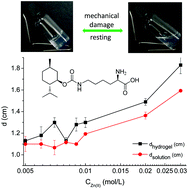(−)-Menthol based thixotropic hydrogel and its application as a universal antibacterial carrier†
Abstract
A kind of novel hydrogelator based on (−)-menthol, a traditional cooling compound, tailed by an amino acid derivate through an alkyl chain, has been designed and synthesized. The hydrogelator containing an L-lysine can form a stable hydrogel with thixotropic character in a large pH range. An interesting feature is that the viscoelastic character of the hydrogel can be enhanced by mechanical force. The mechanism of the self-assembly process was investigated by means of IR, SEM, AFM and X-ray diffraction. The formation of three dimensional multiporous networks through acid base interactions and strong double hydrogen bonding between amino acids is proposed to be the driving force for the construction of the stable hydrogel. As a result, the hydrogelator can further gelate aqueous solutions of some confirmed antibacterial agents such as Zn2+ and a series of water soluble organic antibiotic medicines like lincomycin, amoxicillin, etc., in such a unique way that the concentration of the antibacterial agents loaded into the hydrogel can be tuned to a large extent. The antimicrobial susceptibility of the hydrogels loaded with Zn2+ or lincomycin is much more effective than that of the corresponding aqueous solution tested by the Oxford cup method. Furthermore, the hydrogelator is completely innoxious to living cells by measurement of MTT assay. Thus, the hydrogel can be developed as a universal carrier for antibacterial agents and may also be widely used in the fields of cell culture, tissue engineering, or drug delivery systems.


 Please wait while we load your content...
Please wait while we load your content...